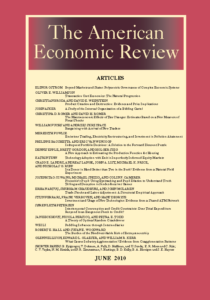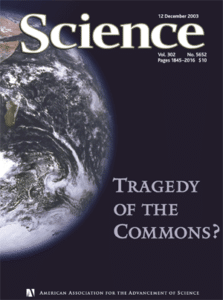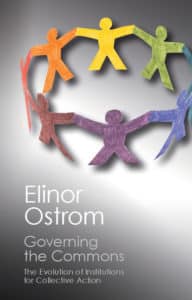Some publications have over the years become must-reads for anyone involved in commons issues, as these have in one way or another become key publications within the discourse on commons and common-pool resources. Please find some reading suggestions underneath; some can be downloaded directly.
 | Ostrom, Elinor ‘Beyond markets and states: Polycentric governance of complex economic systems’ American Economic Review 100, no. 3 (2010): 641-72. Abstract Contemporary research on the outcomes of diverse institutional arrange-ments for governing common-pool resources (CPRs) and public goods at multiple scales builds on classical economic theory while developing new theory to explain phenomena that do not fit in a dichotomous world of “the market” and “the state.” Scholars are slowly shifting from positing simple systems to using more complex frameworks, theories, and models to un-derstand the diversity of puzzles and problems facing humans interacting in contemporary societies. The humans we study have complex motivational structures and establish diverse private-for-profit, governmental, and community institutional arrangements that operate at multiple scales to generate productive and innovative as well as destructive and perverse outcomes (North 1990, 2005). DOI: 10.1257/aer.100.3.641 (subscription may be required) Abstract and journal cover image published by non-exclusive permission from American Economic Association. |
 | Thomas Dietz, Elinor Ostrom, and Paul C. Stern, 2003. ‘The struggle to govern the commons’ Science 302 (5652): 1907-12 Abstract Human institutions—ways of organizing activities—affect the resilience of the environment. Locally evolved institutional arrangements governed by stable communities and buffered from outside forces have sustained resources successfully for centuries, although they often fail when rapid change occurs. Ideal conditions for governance are increasingly rare. Critical problems, such as transboundary pollution, tropical deforestation, and climate change, are at larger scales and involve nonlocal influences. Promising strategies for addressing these problems include dialogue among interested parties, officials, and scientists; complex, redundant, and layered institutions; a mix of institutional types; and designs that facilitate experimentation, learning, and change. DOI: 10.1126/science.1091015 (subscription may be required) Abstract and cover image from website American Association for the Advancement of Science (AAAS), reprinted with permission from AAAS . Readers may view, browse, and/or download material for temporary copying purposes only, provided these uses are for noncommercial personal purposes. Except as provided by law, this material may not be further reproduced, distributed, transmitted, modified, adapted, performed, displayed, published, or sold in whole or in part, without prior written permission from the publisher. |
 | David Feeny et al., 1990. ‘The tragedy of the commons: twenty-two years later’ Human Ecology 18(1): 1-19 Abstract Hardin’s Tragedy of the Commons model predicts the eventual overexploitation or degradation of all resources used in common. Given this unambiguous prediction, a surprising number of cases exist in which users have been able to restrict access to the resource and establish rules among themselves for its sustainable use. To assess the evidence, we first define common-property resources and present a taxonomy of property-rights regimes in which such resources may be held. Evidence accumulated over the last twenty-two years indicates that private, state, andcommunal property are all potentially viable resource management options. A more complete theory than Hardin’s should incorporate institutional arrangements and cultural factors to provide for better analysis and prediction. DOI: 10.1007/BF00889070 (subscription may be required) Cover image and abstract published by permission Springer Publishers. |
| Bromley, Daniel W. and David Feeny, eds. Making the commons work: Theory, practice, and policy San Francisco, CA: ICS Press, 1992 Library copies of this book (WorldCat) |
|
 | Ostrom, Elinor Governing the commons. The evolution on institutions for collective action Cambridge University Press, Political economy of institutions and decisions series, 1990 Abstract The governance of natural resources used by many individuals in common is an issue of increasing concern to policy analysts. Both state control and privatization of resources have been advocated, but neither the state nor the market have been uniformly successful in solving common pool resource problems. After critiquing the foundations of policy analysis as applied to natural resources, Elinor Ostrom here provides a unique body of empirical data to explore conditions under which common pool resource problems have been satisfactorily or unsatisfactorily solved. Dr. Ostrom first describes three models most frequently used as the foundation for recommending state or market solutions. She then outlines theoretical and empirical alternatives to these models in order to illustrate the diversity of possible solutions. In the following chapters she uses institutional analysis to examine different ways–both successful and unsuccessful of governing the commons. In contrast to the proposition of the tragedy of the commons argument, common pool problems sometimes are solved by voluntary organizations rather than by a coercive state. Among the cases considered are communal tenure in meadows and forests, irrigation communities and other water rights, and fisheries. Website editor Abstract and book cover image published by non-exclusive permission from Cambridge University Press. |
| Cox Buck, Susan J. ‘No tragedy of the commons’ Environmental Ethics 7, no. 1 (1985): 49-61 DOI: 10.5840/enviroethics1985716 (subscription may be required) |
|
 | Hardin, Garrett ‘The tragedy of the commons’ Science 162 no. 3859 (1968), 1243-48 DOI: 10.1126/science.162.3859.1243 (subscription may be required) |
The items displayed above are the most cited articles on commons issues worldwide. Below, you will find references to additional important publications on commons issues worldwide over the past decades (most recent on top).
See our Resources page
We of course you also recommend you the resources below
The International Journal of the Commons is a peer-reviewed, open-access journal published by the IASC at least twice a year, containing peer-reviewed academic articles from a wide range of disciplines on a broad spectrum of commons issues worldwide.
The Commons Digest is an exclusive quarterly publication of the IASC, containing short articles, forum responses, book reviews, bibliographies, and letters to the editor.
The IASC is supporter of the Digital Library of the Commons (DLC). The DLC is a gateway to the international literature on the commons. The DLC acts as a repository and provides free and open access to full-text articles, (conference) papers, and dissertations on commons issues.
The DLC contains:
The Digital Library of the Commons is hosted by the Vincent and Elinor Ostrom Workshop in Political Theory and Policy Analysis, based at the University of Indiana in Bloomington (IN), USA.